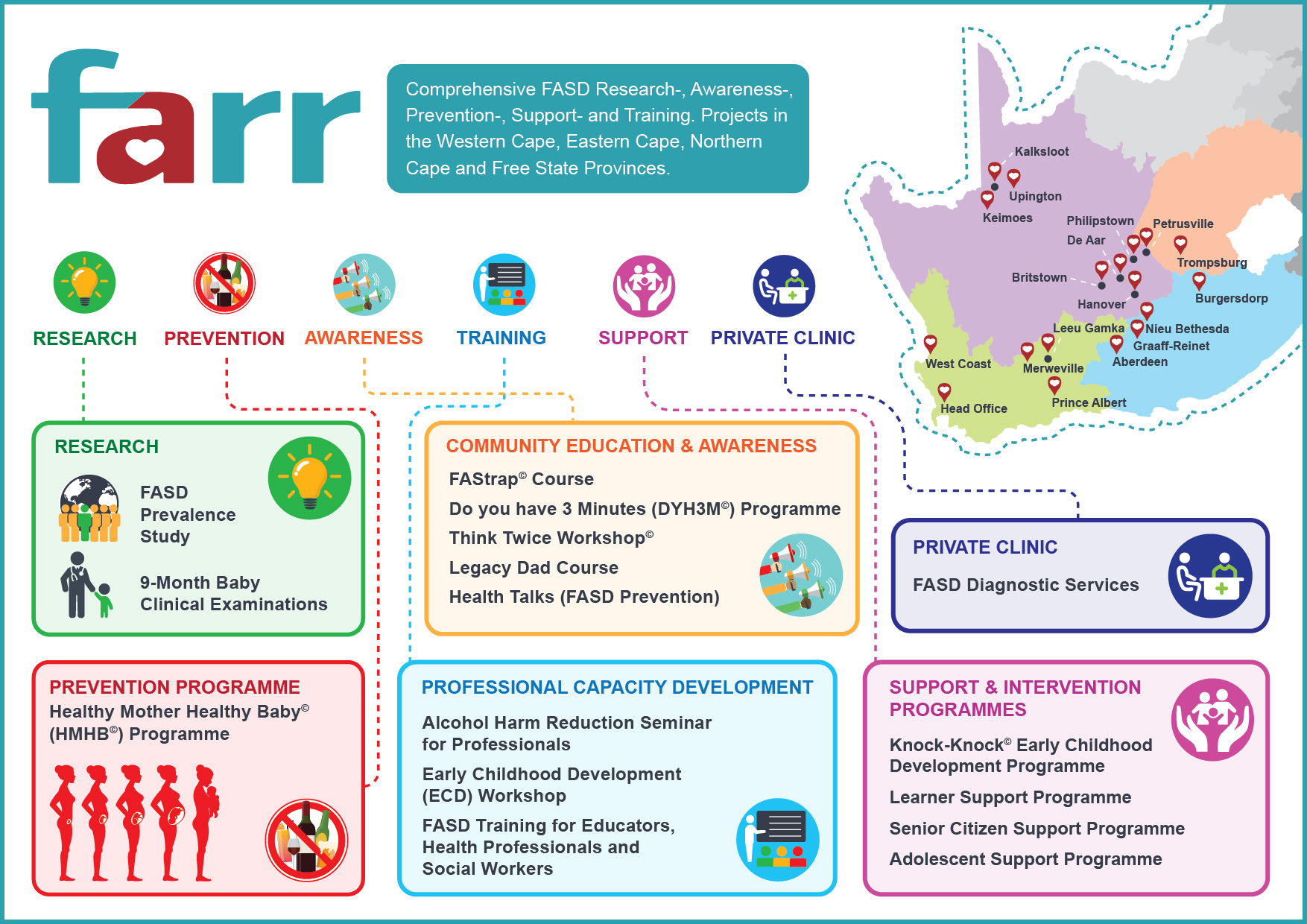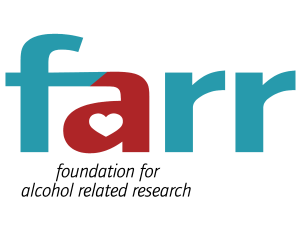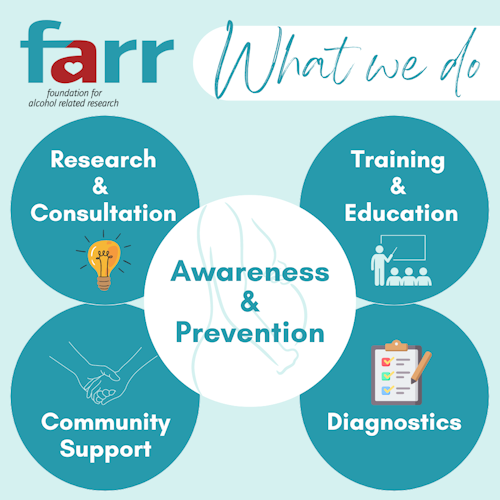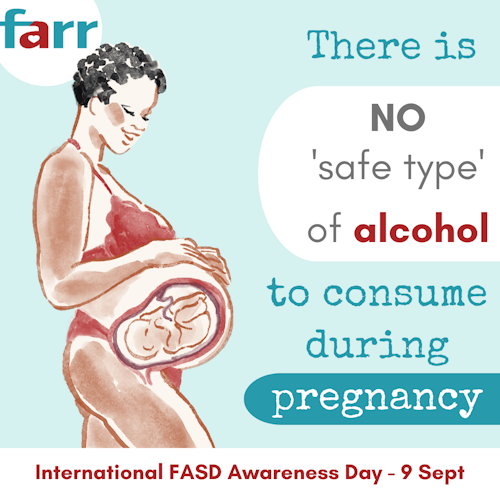What we Do
FARR understands the far-reaching implications of FASD and its impact on affected people and communities. We thus strive for long-term sustainable impact though our work which includes:
- Social Awareness
- Research and Consultation
- Prevention Programmes
- Training and Education
- Community Support Programmes
- FASD Diagnostic Services
FARR works in communities on invitation only. Once invited, we follow an approach that conforms to international standards of research as shown in the diagram attached below:

Our Projects usually offer the following programmes:
Research and Consultation
Research
FARR is a research-based organisation and the research that FARR conducts is an integral part of our work.
To date, FARR has conducted 19 FASD Prevalence Studies in 5 of the 9 provinces of South Africa (Free State, Gauteng, Northern Cape, Western Cape and Eastern Cape) and has published more than 65 scientific articles in respected journals such as: Alcoholism Clinical and Experimental Research (ACER), the WHO bulletin, the American Journal of Public Health, and the South African Medical Journal.
A FASD Prevalence Study is conducted to estimate the number of individuals affected by FASD in a certain community or municipal area. We then calculate a Prevalence Rate for that specific area and the extent of the problem in the form of a percentage or per 1 000 individuals in the population. In our research, the Prevalence Rates were reported as high as 276 per 1000 (27.6%) in some communities in the Northern Cape Province (Louw et al., 2024).
All of FARR’s publications are listed in the document linked below.
![]() FARR Publication List – August 2024
FARR Publication List – August 2024
![]() From Evidence to Awareness – Poster Presentation
From Evidence to Awareness – Poster Presentation
![]() What Happened to Them – Poster Presentation
What Happened to Them – Poster Presentation
![]() Task Team Conference – Poster Training
Task Team Conference – Poster Training
Consultation
Part of our work as an organisation striving to raise awareness, and gain support in terms of the reduction of alcohol related harm and Fetal Alcohol Spectrum Disorders (FASD) involves consultation with and within various settings.
This gives us the opportunity not only to engage with Ministers of Provincial and National Departments of Education, Social Development, Health and Agriculture, but also participate in policy formulation and the development of programmes or curricula.
Our interactions with national and international universities are mostly through post-graduate students doing studies in partnership, but at times we also receive invitations to lecture to both under and post graduate students.
Liaison with researchers from South Africa and other countries gives us the opportunity to answer burning research questions, test new interventions and develop evidence-based programmes.
Consultations with national and international FASD groups, researchers, clients, parents/caregivers give us the opportunity to share information, but at the same time also to learn from their experiences. As part of these interactions, we attend and present at local and international meetings, conferences, and workshops.
Establishing networks through these consultations and partnerships has led to FARR being a member of the Western Cape FASD Network, represented by Dr Jaco Louw, and Dr Leana Olivier being elected as the Chairperson of the Africa.FASD Network. Dr Olivier also serves on a number of other international committees and advisory boards.
Over the years we have built up good support with local and international media, as a result of this FARR is often invited to participate in national and international radio, TV and other media interviews or campaigns. This gives us the opportunity to reach much further than could possibly be measured.
Set up a media interview with Dr Leana Olivier by contacting info@farrsa.org.za
Prevention
Healthy Mother Healthy Baby© (HMHB©) Programme
The Healthy Mother Healthy Baby© Programme is a targeted approach to Fetal Alcohol Spectrum Disorders (FASD) prevention based on brief motivational interventions with pregnant women, as a measure to promote prevention of FASD. The Programme is based on the belief that a healthier baby is the product of a healthier pregnancy and thus encourages healthy habits during pregnancy.
N.B. the programme does not only focus on pregnant women who are using alcohol, all pregnant women who are less than 20 weeks pregnant are invited to enrol.
The original HMHB© Programme was developed and piloted in 2008/2009. It was then implemented in 2009 – 2012 in De Aar and Upington (Northern Cape Province). The Programme was further refined (HMHB© PLUS Programme) at specific Project sites in other Provinces in an attempt to make it more practical, impactful and cost-effective.
In collaboration with Health Care facilities in our project areas, pregnant women below 20 weeks gestation are recruited to take part in the programme, thus adding to the existing antenatal-care programmes. Our clients are offered a series of structured intervention sessions with our experienced Project staff throughout their pregnancy as well as after the birth of the baby.
Once mothers have completed the Programme, a 9-Month Baby Clinic (at least 9-months after the babies were born) is conducted at each project site. During the Baby Clinic each baby receives a paediatric examination by a Medical Specialist, during which the baby is screened for FASD and necessary referrals are made. If FASD is suspected, the baby is referred for a Developmental Assessment and an interview is conducted with the mother. Babies suspected of having FASD are discussed at a Case Conference, where all the medical data is integrated and a diagnosis is made with the multidisciplinary team present. Feedback is provided to all mothers’ whose babies were referred.
Training and Education
A serious and growing need for community members, parents, caregivers and professionals (i.e. health care workers, social workers and educators) to be better informed about the risks of prenatal alcohol exposure and the prevention of Fetal Alcohol Spectrum Disorder (FASD), was the main driving force behind the establishment of a dedicated Training Academy at FARR in 2008.
Education and Training Programmes offered for:
1. Community members, Blue collar workers, Farm and General workers:
- FAStrap© Course
Best suited for those who have ± 5 years of schooling, but facilitation can be adjusted for persons who have more/less schooling.
This is a 4-day life skills course consisting of 10 modules, including topics such as: self-image, planning for a child, responsible parenting, discipline, alcohol and substance abuse, etc. Sessions presented are interactive and builds on attendees’ previous experiences, while also using a variety of games, storytelling, roleplays and discussions to enhance the learning experience. Attendees are required to share the information received during the workshop with peers and family, and upon proof thereof (register with 20 names signed), are issued with a Certificate of Attendance.
- Think Twice Workshops
Suitable for general public, company staff, peer educators.
The workshop increases participants’ understanding of the impact of alcohol (ab)use on the individual, the family and community in terms of the physical effects and the psycho-social impact. It also provides a brief overview of FASD, with a specific focus on the important role of male partners in the prevention of FASD. Participants are equipped with the ability to recognize if there is a problem with alcohol and substance abuse, while some decision-making skills and resources for assistance of those affected, are also offered.
(The workshop can be customized according to need e.g. duration can be adapted between 2 – 4 hours).
- Legacy Dad Course:
Course is presented in partnership with Bright Star Lifestyle and The World Needs A FATHER Aimed at fathers with pre-school children
The course, presented in three sessions over two days, guides fathers to build their legacy through the creation of awareness and enhancement of their skills. In the first session, fathers are guided on what it means to become more intentionally involved with their children. Then, it concentrates on Dad’s relationship with his child and emphasizes two techniques to do this. Lastly, the course provides an enspiring perspective on how fathers can interact within the family and broader community.
- Do you have 3 minutes© (DYH3M©) Programme
The DYH3M© Programme is an integral part of FARR’s Fetal Alcohol Spectrum Disorder (FASD) awareness Programmes. The Programme is offered at most Project sites in the form of short (3 min) presentations to individuals and groups (e.g. at Health Care facilities), community members and related health and education professionals. The need for such a condensed awareness intervention arose from….

2. Courses for Professionals (Educators, Social Workers, Therapists and Health Care Professionals):
- Early Childhood Development (ECD) Workshop:
A 3-hour workshop for ECD Practitioners providing basic information about FASD and its effects on early childhood development. Three common challenges experienced by those affected, and how it manifests in the ECD classroom, are highlighted. In relation to these challenges, basic techniques and tools are exchanged in view of enhancing the ECD practitioners’ understanding and management of children. A basic toolkit is also provided to all participants.
- Alcohol Harm Reduction (AHR) Seminar for Professionals:
A 1-day seminar hosted annually at project sites. Delegates include local multi-disciplinary professionals working for government, NGO’s, CBO’s etc. It provides a platform to share important FASD and FARR project information, clarifies various stakeholders’ mandates and interventions, and creates networking opportunities.
- Course for Foundation Phase Educators, Health Professionals, Social Workers:
A 2-day course presented to various professionals in the health, welfare and educational sectors. The first day contextualizes alcohol and substance (ab)use and its physical and psycho-social effects, it provides an overview of FASD, the epidemiology and how it is diagnosed, as well as develops insight into important human rights and ethical issues. The second day is devoted to profession-related theory and role clarification while discussing the management of those affected at the hand of case studies and group work activities.
CPD Accreditation for professional persons is obtained (where possible) from the Health Professionals Council of South Africa (HPCSA) and the South African Council for Social Service Professions (SACSSP).
Community Support Programmes
1. Knock-Knock Early Childhood Development Programme:
A community-based programme offered at the homes of clients, focusing on supporting mothers to stimulate the development of their pre-school children through play, reading and storytelling. By doing this the mother-child bond is strengthened, optimum development and school readiness are facilitated. The wellbeing of other individuals in the household, such as the parent/caregiver, the elderly and other household members are also assessed during these home visits. This 8-week programme consists of 7 sessions at home and one group session at the FARR project centre. On completion the mother receives a certificate. The child receives gift such a toy and/or storybook (when donations are available).
2. Learner Support Programme:
This support programme for primary school learners diagnosed with FASD or other learning disabilities, is offered by FARR at the school. The goal of the programme is to promote essential areas of development through play and interactivities games and activities. These foundation skills/areas of development play an important role in and assist children with reading, writing, mathematics etc. The programme is facilitated once a week for a period of 30 weeks (excluding school holidays), involving small groups of learners.
3. Adolescents Support Programme:
A total of 11 group sessions are offered per annum to adolescents within the age group of 12-18 years. The aim is to discuss basic life skills and enhance informed decision making in terms of forming and maintaining healthy relationships, personal hygiene, prevention of substance abuse and teenage pregnancies. Sessions are interactive through topic discussions, watching related movies and engaging in arts and crafts.
4. Senior Citizens Support Programme:
A total of 11 group sessions are offered to community members, older than 50 years. These individuals are often the opinion leaders in the community and/ or primary caregivers of grandchildren. The objective is to develop insight into relationships and their role in the community as caregivers, to create awareness of substance abuse and focus on the improvement of their own physical and emotional wellbeing. The programme consists of discussions, art therapy and other creative activities.
Private FASD Diagnostic Clinic
It is of utmost importance that the appropriate scientific diagnostic criteria are followed when diagnosing FASD. Most importantly to prevent the labelling and stigmatization of an individual and his or her family, but also to avoid misdiagnosis as a result of certain ethnic features which are common in a multi-cultural society such as South Africa.
The diagnosis of FASD can only be made by a multi-disciplinary team of trained specialists using the Institute of Medicines Model (IOM). This would include:
- A Medical Examination by a Medical specialist, trained in the diagnosis of FASD, making use of scientific testing and assessment tools and methods.
- A Cognitive Assessment by a trained Psychometrist using a battery of measures to assess cognitive/developmental functioning.
- An extensive interview of the mother to understand the type, time and amount of alcohol the mother consumed during the pregnancy.
FARR Private FASD Diagnostic Clinic:
As part of our diagnostic and support services, FARR offers private FASD diagnostic services at our Head Office in Bellville, Cape Town. This service is available for both adults and children. An assessment for FASD consists of a medical examination by a Medical Specialist, as well as a Cognitive Assessment administered by a Psychometrist. Extensive collateral information regarding prenatal history, birth, childhood and beyond is gathered to have a holistic view of the individual.
This is a paid service and professional tariffs adhering to medical insurance requirements apply upon appointment.
For further information about the Private Clinic, or to enquire about an appointment, please contact: info@farrsa.org.za or (021) 686 2646.



FARR is committed to increasing awareness amongst all South Africans regarding the importance of not consuming any amount of alcohol during pregnancy to ensure FASD prevention in our country.
The cost of the management and treatment of any birth defect is more than the cost to prevent it, in other words: Prevention is more cost effective than management and treatment. The usual prevalence rate of serious birth defects in a community is between 1-3%. This is defined as a defect, abnormality or disability that causes major hindrance to the full capacity development of a person. FASD is thought to affect at least 7 million South-Africans. Unfortunately, these statistics do not demonstrate the full effect of alcohol exposure during pregnancy as the broader effects of FASD such as Alcohol Related Neurodevelopmental Disorders (ARND’s) and Alcohol Related Birth Defects (ARBD’s), are generally difficult to diagnose.
It is estimated that FASD costs the USA more than $6 billion (approximately R42 billion) annually. In South Africa, the financial burden of FASD will fall on the Government and it’s tax payers. The cost of FASD in South Africa has not yet been fully assessed to date. The full impact of FASD is in fact immeasurable until the full extent of the far reaching implications for the individual, the family and community can be measured. The diagnostic costs and the management of the primary disabilities are immense. If undetected and untreated many individuals with FASD present with secondary disabilities such as mental- and other health problems, substance and other forms of abuse, consequences of risky behavior and conflict with the law. In light of this, it is apparent that all efforts should be put in place to raise awareness about the harmful effects of alcohol exposure during pregnancy and the importance to prevent children from being born with FASD.